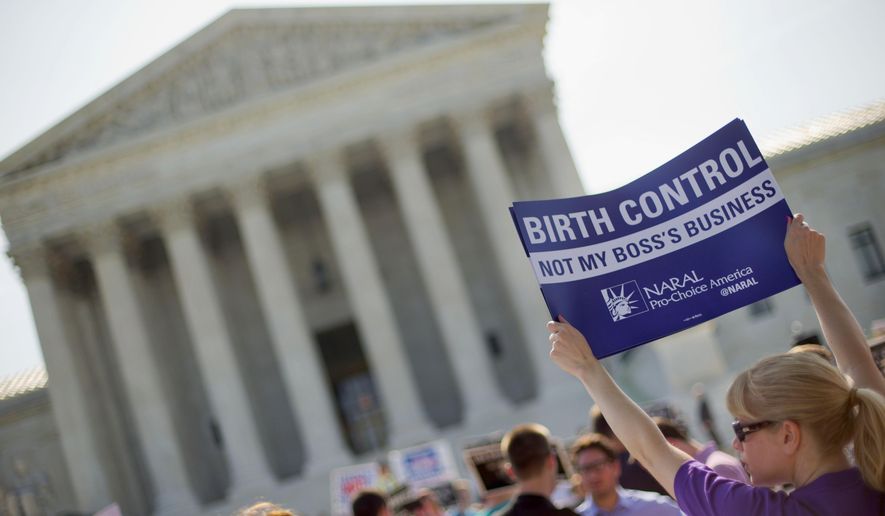In the latest high court test for President Obama’s signature health care law, the Supreme Court will hear lawsuits from religious nonprofits who say the government didn’t go far enough when it offered to protect them President Obama’s birth control mandates for employers.
The justices on Friday agreed to hear seven cases brought by faith-based colleges and ministries from across the country, marking the fourth time that a skirmish over all or part of Obamacare has made it to the Supreme Court.
It’s also the second time the justices have agreed to referee the so-called “contraception mandate,” an outgrowth of the Affordable Care Act of 2010 that requires employers to cover 20 types of FDA-approved drugs and services as part of their health plans.
Pitched as a boon for women’s health, the contraception rules spawned controversy from the start, with dozens of religious nonprofits and devout business owners filing suit. In particular, the groups object to covering so-called “morning-after pills” that they equate with abortion.
The justices shielded certain corporations from the mandate in 2014. But in March, the court will look beyond the mandate itself and decide if the Obama administration’s olive branch to the objecting nonprofits still imposes an undue burden.
The nonprofits object to a government opt-out form designed to put up a firewall between the nonprofits and the mandated coverage, while still allowing their female workers to obtain the drugs and services.
Faith-based groups say the waiver drafted by the Health and Human Services Department still makes them complicit in sinful activity, so they should receive a full exemption from the rules.
Plaintiffs who successfully petitioned the court include the Little Sisters of the Poor, a chapter of nuns in Denver who provide elder care to the needy.
“The Little Sisters spend their lives taking care of the elderly poor — that is work our government should applaud, not punish,” said Mark Rienzi, senior counsel of the Becket Fund for Religious Liberty.
Yet seven out of eight appellate courts have sided with the administration, which argues the nonprofits cannot point to paperwork, which declares their opposition to the rules, as a religious infringement.
Justice Department attorneys have compared the nonprofits to conscientious objectors who duck the draft and then want to block the government from naming someone else to fight.
The justices shielded closely-held corporations from the mandate last year in a case known as “Hobby Lobby.” In a 5-4 ruling, the court said the mostly family-owned for-profits were protected by the 1993 Religious Freedom Restoration Act, forcing HHS to draft an accommodation for them.
Those rules, finalized in July, granted closely held corporations the same type of opt-out clause that HHS offered religious nonprofits.
Under that policy, faith-based universities and charities notify either their insurers or the federal government of their objection to providing contraception, and the insurers or plan administrators would then step in and make sure employees can get contraception without the religious charity having to pay for it.
After a series of high-level defeats, the U.S. Court of Appeals for the Eighth Circuit sided with the nonprofits in September, creating the type of split among lower circuits that makes cases ripe for Supreme Court review.
“If one equates the self-certification process with, say, that of obtaining a parade permit, then indeed the burden might well be considered light. But if one sincerely believes that completing Form 700 or HHS Notice will result in conscience-violating consequences, what some might consider an otherwise neutral act is a burden too heavy to bear,” wrote Judge Roger L. Wollman, appointed by President Reagan, a Republican.
Others say the mandate fulfills a vital function, and that the justices would set a dangerous precedent if they rule for the nonprofits.
“We fight every day to protect the constitutional right to freedom of religion, but that right does not extend to imposing your beliefs on others and discriminating against them,” said Louise Melling, deputy legal director at the American Civil Liberties Union. “If the court rules in favor of the employers in these cases, women will lose a benefit guaranteed by law and will literally be paying for their employers’ beliefs.”
• Tom Howell Jr. can be reached at thowell@washingtontimes.com.




Please read our comment policy before commenting.